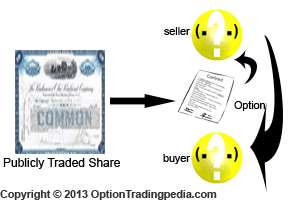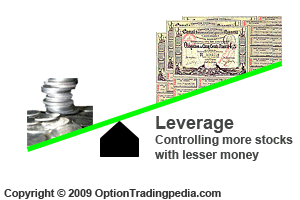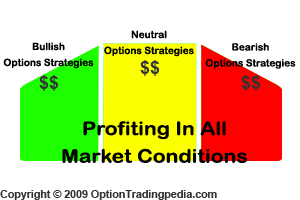|
Options Trading In Layman Terms
So, why is options trading such a hype now?
What is options trading and what can it do for me?
Options Trading, or Option Trading, is simply trading options in the stock market rather than the stocks themselves. As options trading is most commonly done through online options brokers,
options trading has also been referred to as "Online Options Trading" or "Online Option Trading".
(Get a list of online options brokers in a new window)
So, what in the world is this thing called "Options"?
Options are contracts that give you control over the stocks that they cover just like how a small foot pedal in your car gives you control over the whole engine. The foot pedal itself doesn't do anything on its own but because it is derived from the engine as part of your car's engine system, it is capable of controlling the engine eventhough it is just a small piece of metal compared to the engine.
Similarly, options are small and cheap compared to the stocks that they are derived from (known as a "Derivative Instrument") but are capable of allowing you to control the profits made on the stocks using only very little money. You can actually participate in same the profits on a $50 stock by buying a cheap $1 option on it as if you owned the stock itself. If that stock moved $5 upwards from $50 to $55, you could actually make that $5 profit if you bought the stock for $50 (10% profit) or you could make that same $5 profit if you bought the option for just $1 (500% profit!)! Yes, this is leverage, the power to make more money with lesser money. In this sense, stock options are really very much like the "Option To Buy" or "Option to Purchase" you sign when you decide to buy a house. That "option" you sign with the seller of the house locks in the purchase price to be transacted at no matter what the open market price of this property will be on the day of the transaction itself.

What Is Options Trading
The power of leverage is one of the most powerful and most important aspect of options trading and is what gained options the reputation of "Leveraged Instrument". The beauty of options trading is that you can actually trade options without owning the underlying stock itself. You don't need to own stocks in order to trade options on them at all! In the example above, you don't have to own that $50 stock in order to buy that $1 option at all! Simply buy the option and profit as if you own the stock itself. This enables you to participate in the price movement of expensive stocks using only very little money. This is the same power of leverage "Home Flippers" (people who goes into a transaction for a house only to quickly sell it at a higher price) utilize when flipping houses without closing. When the price of the property is higher than the price in their option to purchase, they simply turn around and sell the option to purchase to a real buyer who will then just pay the home flipper the difference between the market price and the option price. So, with the small deposit on the option to purchase, home flippers controlled the profit on the home price as if they owned the home. This is the exact same principle at play in call options trading.
There are other leveraged instruments such as futures which should not be confused with options. There are people who confuse futures trading with options trading, going as far as to call it "Futures Options Trading". There are also people who confuses bonds with options trading, using the terms "Bonds" and "Options" interchangably. Read more about the Differences Between Futures and Options and the Differences between Bonds and Options. Publicly traded options are also different from Employee Stock Options. Learn more about Employee Stock Options.
Further Learning:
Why Trade Options? | Classes of Options | Popular Forms of Options | Do All Stocks Have Options | How To Start Learning Options Trading
Why Trade Options?
Successful Investors like Robert Kiyosaki and Robert G Allen have popularised options trading through the use of options strategies as part of an overall strategy to financial freedom. They preach that options trading is the investment of the rich. So, what makes options trading so powerful?
Option Trading Grants Unprecedented LEVERAGE!
As mentioned above, option trading is LEVERAGE! Trading options allows you to potentially make over 10 times more profit on the same move in the underlying stock than if you bought the stock itself! The leverage power of option trading is perhaps the main reason why traders with small funds choose to trade options. Even though options were initially designed to be a hedging tool instead of a leverage tool, option trading is still a great way to profit while risking only very little money.
Furthermore, the power of leverage in option trading is unique because it is not a fixed amount of leverage but a variable amount of leverage depending on the different strike prices and/or expiration months that is chosen! It is also this variability of leverage that makes option trading suitable for traders of any risk tolerance when used correctly. You can be as aggressive or as conservative as you wish in option trading by choosing options of the corresponding strike price and expiration.

Options Trading For Leverage
Option Trading Grants Unprecedented PROTECTION!
Option trading not only gives you leverage, but also PROTECTION! When a stock moves AGAINST you, an options trader could potentially make a lesser loss than the stock trader because your maximum loss is limited to the price you paid for the option, which could be as little as 10% of the price of the stock, or lesser!
You can also protect your stocks from dropping in value through option trading by buying the same number of put options as the number of shares that you own. In this case, those put options act as an insurance policy, protecting your shares from dropping in value. This is what we call a Protective Put
Option Trading Grants Unprecedented FLEXIBILITY!
Option Trading allows you to profit from every possible move in the underlying asset! Up, Down or Stagnant, there is an option strategy that allows you to profit from that exact move.
Options strategies are capable of performing wonders such as profiting from BOTH an up or down move, or profiting even when the underlying stock stays stagnant!

Options Trading Profits In All Market Conditions
There are even times when stock trading is riskier than option trading! Read about How Stocks Can Be Riskier Than Options. This is also why I wrote this option trading tutorials site to teach the world about this wonderful trading instrument.
Classes of Options
There are two main classes of options in options trading; Call Options and Put Options.
Call options, also known simply as "calls", are contracts that give you the right but not the obligation to buy the underlying stock at the strike price anytime before expiration. In layman terms, it simply means that if you think the price of a stock is going upwards, you would buy a call option to lock in a fixed price now so that you can sell it for a higher price later when the price of the stock rises.
Learn exactly how Call Options work.
Put options, also known simply as "puts", are contracts that give you the right but not the obligation to sell the underlying stock at the strike price anytime before expiration. In layman terms, that simply means that if you think the price of a stock is going to go downwards, you would buy a put option to lock in a fixed price now so that you can sell it for a higher price later when the price of the stock falls. Yes, put options allows you to actually bet on the underlying stock going downwards and profit from it!
Learn exactly how Put Options work.
In a nutshell, you would buy call options when you think the underlying stock is going to go up and buy put options when you think the underlying stock is going to go down. Just remember "Call UP, Put DOWN", Call up a friend and put down the phone. However, this is merely the most basic way of trading options. There are alot more you can do with options through options strategies.
Popular Forms of Options Trading
Apart from stock options trading, there are many other forms of options that has special trading characteristics which sets them apart from the "Plain Vanilla Options" stated above. These options are collectively known as "Exotic Options". One of the most recently popular forms of exotic options are what are known as "Binary Options". Binary Options have been raging through the media in recent years and is also the center of much controversy.
Binary options are options that allow you to "bet" on one of two possible outcomes, hence the term "Binary". If you are correct about the outcome, you receive a fixed payout and if you are wrong, you lose your investment towards the binary option. This along with the fact that Binary Options has extremely short expiration, sometimes as short as 15 mins, and that the profit payout is normally smaller than the purchase price of the binary option, it has become better known as a gambling activity rather than an investment or trading activity. Indeed, the extremely short expiration has made all fundamental or technical research on the underlying redundant. In fact, almost all of the binary options brokers out there today are not registered trading entities nor do they place orders in the open stock market. They simply run their binary options site like gambling sites with no real options nor market created. Binary options traders are mainly just placing "trades" against the Binary Options brokers who act as "bookmakers" and then gambling against disfavorable odds. As such, we urge all beginners to options traders to steer clear of Binary Options trading until such time it gets proper regulation and also not to confuse Binary Options trading, which is pure illegal gambling in most cases, with actual stock options trading that is a real investment actitivy.
Do All Stocks Have Options?
However, not all publicly traded stocks in the stock market offer stock options for options trading over the exchanges. Stocks that do have options are known as "Optionable Stocks". A company must fulfill the following criteria before their options are allowed to be traded publicly:
1. The closing price must have a minimum per share price for a majority of trading days during the three prior calendar months.
2. The company must have equal to or more than 2,000 shareholders.
3. The company must have equal to or more than 7Million publicly held shares.
4. The stock must be listed on the NYSE, AMEX or Nasdaq.
Companies without publicly traded stock options may still have stock options circulating within the company and one common form are Employee Stock Options.
The above are only requirements generally required by all exchanges. Specific listing criteria change from time to time and from exchange to exchange. Some exchange even requires a qualitative check on the type of company and its potential before allowing their stock options to be publicly traded. (This paragraph was included in response to a question by a reader.)
Read The Full Tutorial On Stock Options Now!
How To Start Learning Options Trading?
Ready to learn more about options trading? Indeed, what is presented here on this front page is merely an introduction to what options trading is. In fact, it is too simple to even constitute the basics of options trading. Options are extremely powerful and beyond the simplistic nature of buying calls in an upside bet and buying puts in a downside bet, options can be infinitely complicated and powerful. As such, we have prepared for you detailed guides on basic and advanced options trading knowledge all for free.
First of all, start with our Options Trading Basics Guide. It contains a list of tutorials that you must finish in order to have a comprehensive understanding of what options are. It covers everything from how options work, options moneyness, risks of options trading, how to open an options trading account, the different types of execution orders for options trading and more.
After you are done with the basics of options trading, you can then move on to an advanced understanding of the mechanics of options trading, including advanced options strategies with our Advanced Options Trading Guide. It covers everything from options greeks mathematics, delta neutral trading, hedging, options arbitrage and more.
|